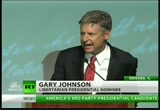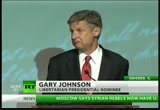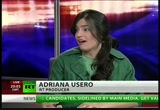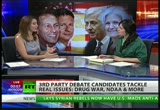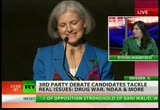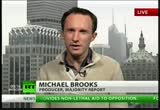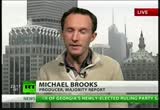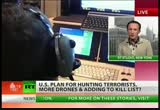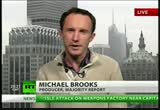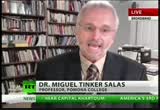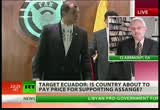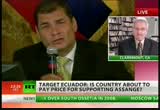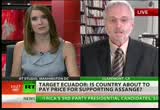tv [untitled] October 24, 2012 4:00pm-4:30pm EDT
4:00 pm
well the presidential dark horses finally had their time in the limelight and last night's a third party presidential debate they covered all the things president obama and mitt romney missed out on the n.d.a. legalising drugs of five and more of a wrap up straight ahead. and a new new report details the obama administration's efforts to create the next generation targeted kill list called the disposition matrix will dive into what the report says and look into the role drones play in u.s. security. and what some are calling a tit for tat political move by tribunals forcing aqua door to pay the largest
4:01 pm
investor state penalty in history one point eight billion dollars for allegedly violating a trade agreement is this the worst helis hoary move against the country for granting political asylum to wiki leaks founder julian assange and our team questions more. well it is wednesday october twenty fourth four pm in washington d.c. my name is christine freeze out there watching are today. last night r.t. aired the presidential debate for third party candidates live out of chicago the debate was moderated by larry king sponsored by the free and equal lections foundation and well neither mitt romney nor president obama showed up it was attended by former new mexico governor gary johnson of the libertarian party the green party's dr jill stein former virginia congressman virgil goode with the
4:02 pm
constitution party and former salt lake city mayor rocky anderson with the justice party began it spoke about several topics including something that we speak about quite a bit here at r t a national defense authorization act signed into law by president obama you know a year ago. we would have never signed the national defense authorization act allowing for you when i was you was that is to be arrested and detained without being charged that's the reason we call or is this. it's an outrage ten twenty one and it would. start with. it's kind of the trail of our civil liberties that the president has assumed dictatorial rights to put us in prison at his pleasure without charge or without trial this is an allowable and is a basic offense against the very foundation of american liberty and it's.
4:03 pm
i should mention this debate was aired on c.n.n. c.-span and al-jazeera as well but none of the major cable networks aired it even though one of those networks c.n.n. is where larry king spent decades working for candidates agreed on more than they disagreed upon but last night their ideas and their faces were thrust into the spotlight something that doesn't happen often despite being on the ballot in several states they spoke also about another issue that has played a major role in our elections and in our democratic process as a whole campaign finance here are a couple of the candidates speaking about that. the political action committee is not just a business. no political action committee individual contributions and no super pacs and i believe congress can craft legislation with presidential leadership to stop political action committee big money.
4:04 pm
the greatest hindrance in my opinion to free and open elections and freedom and democracy and country we threw off the king and the revolution because of have it had we need a pact and both parties don't stand up for america when it comes to political campaign contributions that candidate should be required to wear nascar like jacket with patches on the jacket. so what's really needed is one hundred percent transparency so this is the first of two debates for third party candidates are the producer adriano seto joins me now with more on adriano you were here late into the night i was i was joined by i was in good company or as our own liz wahl and abby martin so it was it was good it was interesting it was very good to watch that so i wanted to get your take i mean how do you think this was something i found very interesting i watched it from home and just being on twitter i mean despite not
4:05 pm
being aired on any of the major networks top trends top ten trends for the majority of the debate across the country hash tag third party debate hash tag now that's a debate so they were paying attention what did you make of it i mean i feel honestly it's not that it surprised me sort of just reinforce what i already sort of. had my suspicions about which is people actually really do care about these things people i mean if given a choice giving an avid given an avenue in order to watch they will i mean this is something that interests everybody and anybody who's you know wants to be engaged in the process and we're seeing that increasingly even you know. younger people are and that's the best example twitter right there i mean even throughout the entire electoral season if you will twitter is media has actually played a major role in that people actually watch things while they have their computers on their lap or you know at their computers whatever in order to so you know sort of feel even more engaged so yeah that's
4:06 pm
a great example i mean it's it was pretty astonishing it is really interesting we saw of course during the republican convention how. in moments there was a twitter handle called invisible obama clint eastwood speech and so i think it's a really good point that social media to twitter and particularly plays a role and i think that total want another kind of telling thing was some of the issues covered at the debate and one of the issues we just played a couple of them the national defense authorization act campaign finance which it's shocking to me that this is not spoken about more by the two major candidates barack obama and mitt romney but this is something that they're they have a huge advantage of because of so i guess it makes sense that there are talking about another thing that a lot of people do care about is this war on drugs what is it wired to be devoting so much money so much resources to it to let me play a quick snippet of what was said last night about that. we don't just need to legalize marijuana we need to drug prohibition just like we all call
4:07 pm
prohibition and treat drug use and abuse as a public education if you do that. marijuana is a substance that is dangerous because it's illegal it's not illegal on account of being dangerous because it's not dangerous. so i drink i mean let's talk about this topic i mean this is something again the other candidates don't really speak to why do you think this was an important question raised at last night's debate i think is important just because it's you know it's a national security issue if you if you really think about it i mean all of these things have widespread implications i mean right now we're seeing a lot of i don't to address but you know there are a lot of problems south of our borders and mexico you see that agents going into honduras i mean all of these things so drugs play not only drugs aren't only bad you know that conversation has to be you widen has to there's
4:08 pm
a lot more nuance to it and i think that a lot of people are ready to have that conversation i mean you could just see right there how you know these candidates are all saying listen this isn't working so let's come up with something different you know you may or may not agree with that but still it's something that has to be in the conversation in order to really move forward in that and i think that's what you saw last night although i have to say something i found a little bit troubling was the very small amount of coverage that it got even n.p.r. this morning you know did a thirty second forty second little blurb about the debate last night and really the only thing they referred to was the candidate saying legalize it so you know i think what happens and i know that a lot of people try to do this with ron paul as well making this his his major issue ron paul's major issue is you know of course keep the government out of it but people kept trying to say well i couldn't vote for him because he wants to make heroin legal and he wanted. to make marijuana legal talk a little bit about how sometimes the legalize it drug issue is used to sort of make
4:09 pm
these candidates seem more on the fringe than they actually are yeah that's absolutely that's absolutely point and i think the problem with this is that most of these candidates. when you see them you think there is not a lot of viability to them and you only hear you know if you only have a couple of avenues in order to listen to their message and all you're going to listen to really you know here is you know legalize it that's about it but if you listen to different platforms and different things when you're talking about cutting spending campaign finance reform joel stein you're talking about the green new deal which is actually trying to push forward green technology in order to you know move the economy forward those are things that are actually sort of mentioned already in you know the mainstream debate already in the mainstream media those are already things that are already being talked about are just not highlighted enough because i mean they're so widely politicized so i mean at the end of the day it's really you know perception is the entire deal right so if you don't think they're
4:10 pm
viable or other people are thinking that they're viable then that's why they're not getting you know that sort of headway but if you know other outlets or other you know like us for example give you know these people a platform you're able to say hey this is actually you know for lack of a better term a fit and real quick i ran earlier today in our news room there was an unofficial poll conducted so i want to put up on the screen at the results of that poll this was just asking the question who won last night's debate now do we have the results for that. ok so who won the third party debate well in the inner office it looks like gary johnson got the most with joel stein and rocky anderson coming in after that so you know quite a few people actually watched the debate and had something to say about it yeah i mean i'm not surprised there's a lot to talk about there i go again an unofficial poll producer adriano said late into the night covering this debate thanks so much for coming back on the show today. well
4:11 pm
a drones have been central to president obama's foreign policy especially when it comes to their use for targeted killing most people by now i've heard of obama's kill lists and it looks like the use of drones is not just a temporary strategy for part of a larger counterterrorism plan that will soon be cemented in stone for future generations of presidents to understand better how this was outlined in a pretty explosive article in the washington post the first of three in a series that introduces us to something called the disposition matrix it's become a hot topic of conversation around washington d.c. and our correspondent liz wahl joins us live now from downtown d.c. to tell us a little bit more about this live what is a disposition matrix first of all that's right christine what we know all about the kill list but this actually takes it a step further this disposition matrix it secretly been in the works for about two years now as you had mentioned a recent washington post article maps out the details of this plan and what it does is it maps out
4:12 pm
a plan to find in kill suspected terrorists that can't be found i guess by drone and the way that this works is that this matrix is streamlines information from various government agencies and puts it into one single database so we're talking about suspected terrorists biographies their locations the organizations that they're affiliated with all of this information is streamlined into this one place and with this information they're able to come up with some kind of a game plan to carry out these capture plans of mobilize personnel and resources to actually track down these suspected terrorists whether that means setting out a drone to monitor their whereabouts so it's something like this that signals that be oprah's in obama the obama administration's drone campaign is something that is here to stay because as we know with these kill lists. it's not just one. stagnant list where you knock off
4:13 pm
a suspect and you're down to zero what we've seen happen is that suspected terrorist keep getting added to that list we have members of the whole network and it's just kind of like a game of whack a mole once you knock one down another one pops up so it seems like there is no end in sight was it it's interesting to me too that this is something that you know even if president obama wins a second term they're talking about using this strategy this just position matrix for at least the next decade for many many years to come for future presidents no matter what party to sort of be able to understand and use as a viable strategy is just so interesting because you know from everything we're hearing especially leading up to the election these wars are supposed to be winding down i mean what do you think do you think the secret plan proves otherwise well i mean that's the thing wars are supposed to be winding down the war i guess the war is as we know them are going to be winding down but that doesn't mean that we're literally not going to be involved in this country i think this this report
4:14 pm
absolutely proves otherwise that the drone campaign this report states that this is kind of providing this blueprint for future administrations to be able to carry on this drone campaign and as we have seen in the election so far in the last debate rather the issue of drones is broader for the first time mitt romney held president obama's drone campaign and. obviously it's his campaign so would continue to use it but drones and the use of them has proven to be a bipartisan issue meanwhile critics are pointing to the fact that the drone campaign has gone far beyond the targeted killings of the original intent which is to find those and bring to justice those that are responsible for the nine eleven attacks and here we are over a decade later and it's estimated that the drone campaign has killed more than three thousand people many of these people. all are innocent civilians and there's
4:15 pm
a lot of implications of that on the ground particularly in pakistan the country that has bear the brunt of this drone campaign and what i guess something to take away from this disposition matrix from this report is that targeted drone killings is something this is something that has become institutionalized something that prior to nine eleven was frowned upon taboo or looked down upon today it seems like this targeted killing is ideal and there is no clear end in sight i think it just seems like it is indefinite at the point all right very interesting and certainly it seems because there will be a couple more articles about this we're going to learn a whole lot more are two correspondent lives long live from downtown washington. so i think this is pretty significant but clearly quite a bit we don't know and won't know about it but a live just outline the washington post give the start of the story michael brooks is a producer with majority report and joins me now from our new york city is talk more
4:16 pm
about this michael so the kill list is out but a disposition matrix is in what is the difference between these two. well you know as with so much with this program it's kind of hard to know what is what because a lot of it is still very secret and we're kind of learning this information sort of the leaks out gradually the disposition was seems to be more kind of integrated there is more variables are taking into account but it looks to me like it's something that happens almost before the kill list because it's a way of desegregating who is going to be targeted with a drone or who's going to be arrested or extradited so it seems to me like a model that's used along with the kill list and integrated with it versus maybe a replacement yeah on one hand i mean from what i was reading about it in some ways it just looks like a really federal plan you know if there is a suspect or somebody on this list that's found in
4:17 pm
a country that's unexpected you know it joins the different agencies together and says you know this is how this agency react reacts or responds in this situation this is how they respond in this situation but to say do you think if anything more michael than than just a relief plan. well i think what it is is it's a juror craddick you know these these policies are getting formed and they're getting streamlined things that are we're kind of happening on an ad hoc basis are getting formal as an institutionalized you know what's interesting in the article that's really significant is the whole notion that you know even in the ninety's going after osama bin laden himself was seriously controversial and now the notion of going after specific targets having a kill list and having multiple procedures around it is just getting formalized into the bureaucracy and security structure of washington i mean i think what's
4:18 pm
really problematic here is you don't see a structure accompanying it you don't see you know a geneva convention drones you don't see. the type of more legal humanitarian international law models to go along with how this is being implemented and i think that that's really problematic yes certainly hard to underscore just how significant the temporal legend was in terms of what was viewed as a good option versus a bad option i think it's an important point you make in that article president bill clinton at the time was given the option but you know just using drones was not something that was normal but now we have. david petraeus he is asking not only to keep this drone program but to expand it do you think this indicates that overall the view is that it's been successful well i think it depends on how we're defining success you know barack obama ran a very interesting campaign of foreign policy in two thousand and eight because he
4:19 pm
basically said on one hand look i'll be more aggressive against al qaida than the republicans i'll go into pakistan without permission i'm going to really prioritize hitting certain people and hitting this group which clearly he's done the drones are a significant part of that on the other hand he promised to repair the u.s. image abroad which i think in some respects he has and he's old and he also promised the kind of. shift u.s. foreign policy in a way that the origins of terrorism like just u.s. policies abroad and things like that would be less than than what you've seen here is that while the drone program is maybe tactically successful in getting specific people you've seen the same president who has been able to close guantanamo really in some ways create the next one's hanum own terms of the recruiting tool because
4:20 pm
of the really significant humanitarians hole that the drone program has on the ground so it's of hard oxycodone legacy and i don't think i think tactically it's been a success i don't think strategically in going into the long term it's been a success in the same way it's interesting to drones and mentioned at the presidential debate earlier this week but it was one question and it was only answered by mitt romney take a listen i believe that we should use any and all means necessary to take out people who pose a threat to us and our friends around the world and it's widely reported the drones are being used in drone strikes and i support that entirely and feel the president was right to up the usage of that technology and believe that we should continue to use it to continue to go after the people who represent a threat to this nation president obama did not answer the question but as we see they seem to agree very much do you think there are political implications in the use of drones. well i think there are political implications right now domestically
4:21 pm
because drones are really politically appealing i mean you basically can kind of project force overseas in a way that's more discreet from a domestic u.s. point of view and then you can basically selectively leak look we just killed this guy we just got that guy you can use terms like surgical which you know i think the intention is surgical i don't think that there's an intention to go out and kill civilians but this is obviously not surgical but i think when you hear these numbers three thousand that liz was saying earlier transcripts of killed put that in perspective that's you know a similar number that we heard about you know were killed in the world trade center on september eleventh so i think there's still a lot more that will develop out of this appreciate having you on the show michael brooks producer with the majority report thank you well there are some interesting
4:22 pm
developments in the relationship between the u.s. and ecuador these are two countries that have not for quite some time had many issues between them we did report at length last year when an ecuadorian court ruled that chevron must pay eight point six billion dollars in damages relating to a pollution lawsuit that amount actually later increased to eighteen billion dollars and still chevron has not paid a penny of it they called a judgment fraudulent then we told you about a decision by awkward or to grant wiki leaks co-founder julian assange asylum he's been staying at the ecuadorian embassy for several months still with no way out to speak to you today as a free man. because despite having being detained for six hundred and fifty nine days without. i am free in the most basic and important sense i am free to speak my mind. this freedom
4:23 pm
exists because the nation of ecuador has granted me political asylum and other nations have rallied to support its decision. well since that speech i think un juliana songes health has reportedly been diminishing still at this point he has no safe passage out even if he needed for example to go to the hospital he'd most likely be arrested after any treatment and that is that the three person tribunals has just decided that aqua door must pay one point eight billion dollars to the u.s. based occidental petroleum as far as why it's somewhat unclear a quote contract breach is what's being alleged here i want to bring in miguel tanker solace professor of latin american history at pomona college he is the author of the book the enduring legacy oil culture and society in venezuela. let's talk first professor salis about these allegations that what's this treaty or this contract that ecuador has supposedly breached for the ninety nine accord or
4:24 pm
signed a contract with occidental to produce oil in the block in the area of ecuador. the occidental company for decided to sell forty percent or to transfer forty percent of its interest in that block and they do in companies that's a violation of the hydrocarbon law in ecuador and as a result in two thousand and six ecuador moved to cancel the contract so the allegation on the part of occidental has to do with the council a shell of its contract and the interesting part is that block which was producing under occidental forty four thousand barrels a day is that they producing one hundred forty four thousand barrels a day and that's really what bothers occidental and that's really what they're going after they would want to get back into ecuador they want to get back into the countries that produce oil in the region and this is part of their strategy so do you think this is a viable strategy i mean is this something legally the courts here the courts there that they have a chance. of really being able to get ecuador to pay up. well i think the countries
4:25 pm
of south america for given it's what i believe you have already withdrawn from this court ecuador withdrew from this court in two thousand and nine and doesn't recognize its validity so that ecuador is not going to pay the debt or the judgment they have the fact that they would appeal the judgment and the larger picture within the law south america is that countries like venezuela wallowed and libya have exerted sovereignty over what had been previously a series of hopscotch of contracts given to foreign companies and that's really what the large companies resent because now the state owned companies in fact if you look at venezuela but i feel like well these are state all companies that now are producing and the contestants in those countries depends on your relationship with those they company now certainly a u.s. oil company is not directly connected in any way to the u.s. government but there is concern out there what do you think professor tell us do you think there's any reason to believe that this is in retaliation to ecuador's offer to grant julian a songe asylum i think it adds up to
4:26 pm
a series of pressures on ecuador object to release it provides increased pressure but the initiative before the court had been there since two thousand and six the for the case had been filed in two thousand and six the hearings were in two thousand and eight that reality timing is interesting comes out now and that sense we can say as more pressure to ecuador in the broader context of the case with chevron which is eighteen billion dollars with chevron is not saying but again the attention is given that it's occidental and ecuador is responding by saying it doesn't recognize the court it has natural sovereign rights over oil production and it will continue to pursue those and i recently the foreign minister of ecuador ricardo patino spoke to r.t. and i want to play a quick part of what he said. washington and the u.s. is not our father or a teacher to punish us who have the same rights as they do julian assange is an example a symbol of freedom of speech but there are some countries which try to influence
4:27 pm
things and limit his freedom and even oppress him so that he stops doing what he's doing we want to make them understand that we're protecting freedom of speech as well as a right to life and personal integrity and so he's saying washington the u.s. is not our father or our teacher you know this is regarding you know they feel they have the freedom to do whatever they want with with julian assange why do you think he set this well i think he said it very clearly because in the case of a staunch britain was acting like a total colonial power they said they would intervene and go in embassy they said that they would withhold the right to do that anytime they want to do so in many ways as a response but just remember it from all the countries of south america for support of the case of asylum for a sign that britain has to respect the sovereignty of the great embassy and has to respect the sovereignty of decisions made around hydrocarbons and energy is used the same way that you know nationalized gas biggest oil or reno nationalized oil
4:28 pm
and what or it's done the same think all right if you very it's very complicated but certainly we're going to keep our eyes on what's going on there miguel tinker solace professor of latin american history at promoting college thanks so much and that is going to do it for us for now we will be back here in a half hour i'm christine for south. emission and free cretaceous and free transport charges free range and free. free. to tide free. download free broadcast quality video for your media projects and free media and on to our t. dot com. more
4:29 pm
27 Views
Uploaded by TV Archive on

 Live Music Archive
Live Music Archive Librivox Free Audio
Librivox Free Audio Metropolitan Museum
Metropolitan Museum Cleveland Museum of Art
Cleveland Museum of Art Internet Arcade
Internet Arcade Console Living Room
Console Living Room Books to Borrow
Books to Borrow Open Library
Open Library TV News
TV News Understanding 9/11
Understanding 9/11

